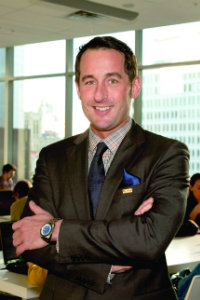To launch a series introducing some of Concordia’s leading instructors, NOW profiles Jordan LeBel, associate professor of marketing in the John Molson School of Business, who was recently awarded a 3M National Teaching Fellowship for his exceptional teaching abilities and committed efforts to enhance the learning experience of every student.
For Jordan LeBel, the job is reward enough. “I love my work,” he says. “I get up early, and I go to bed late. I just can’t get enough.”
What primarily matters to him is each student’s “lasting takeaway.”
“It’s making sure that I bring something to them that they can use,” says LeBel, an associate professor in the John Molson School of Business. “I’ve had those kinds of professors in my life, and that’s the kind of professor I want to be.”
The Society for Teaching and Learning in Higher Education and 3M Canada launched the 3M National Teaching Fellowship in 1986. LeBel’s inclusion is recognition of “Jordan’s creativity, and his dedication to student success,” says Ollivier Dyens, Concordia’s vice-provost of Teaching and Learning.
So how does LeBel do it? To begin with, he tries whenever possible to bring the real world into his classroom, encouraging his students to present and analyze their own marketing discoveries, updating his materials to reflect current trends, inviting a constant stream of guest speakers, and having his students working on live cases with actual marketing clients.
Neal Kierans, an MBA student, recalls giving a presentation to an invited client in LeBel’s popular Experience Marketing class. “You’re presenting in front of somebody you’re trying to inspire, and who might even take your ideas and use them,” he says. “I remember my hands sweating profusely before I even went up on stage. But it was an amazing experience. I remember Prof. LeBel sitting in the background. I could see his expression every time we came up with an idea. He’d be grinning, and happy, and nodding his head.”
Recently, LeBel gave a workshop titled Connecting with Students at Concordia’s first annual Teaching and Learning Winter Festival. His 90-minute presentation was filled with helpful tips on how to keep students engaged along with anecdotes culled from his varied experiences.
For example, LeBel talked about what he learned while growing up in the restaurant business. “When you’re in that industry, you realize you’re there to give a performance, to give good service,” he said. “You have to engineer the conditions by which people will have a good time. You have to do a lot of prep work and remember a lot of details that will contribute to making the evening, and the meal, a success. I approach the classroom in just the same way.”
The pay-off is that students respond to their professor’s enthusiasm in kind. “You want to push yourself for him, because he’s given so much to you in the classroom,” says Kierans. “We all take him seriously because we respect him. That’s the mark of a great teacher.”
LeBel is committed to helping each of his students succeed, no matter how well they perform in class. Many of them ask him for career advice as they approach the end of their degrees. “I want to pursue my career in marketing,” says MBA student Jason Lau. “He spent time to really talk to me about my options.
“He just wants you to do well, so he tries to give you as many tools as he can, and put you in contact with the right people,” Lau adds. “It just really shows that he wants all his students to succeed in life."
At the end of each term, LeBel concludes his classes by imparting “random words of pseudo wisdom.” It’s a way for him to send off his students on a lighter note.
“The last day of class, that detachment from my students, it’s painful,” he says. “So managing these last 10 or 15 minutes is important to me. And I’ve found it’s also important for them.”
One of his favourite lines is, “Life puts you where you need to be, and it usually gives you the tools to succeed.”


